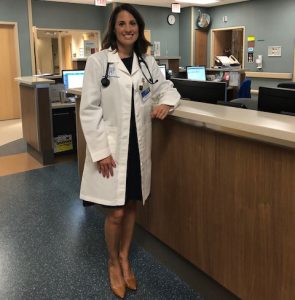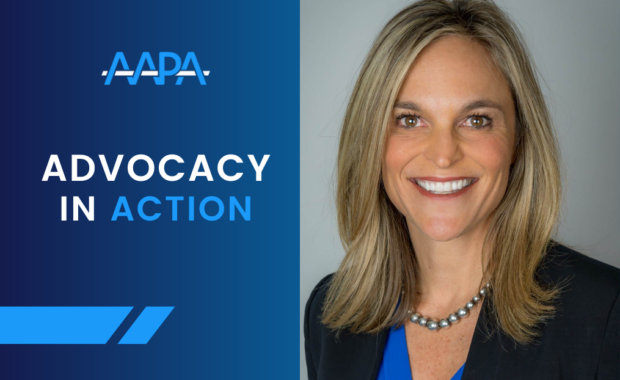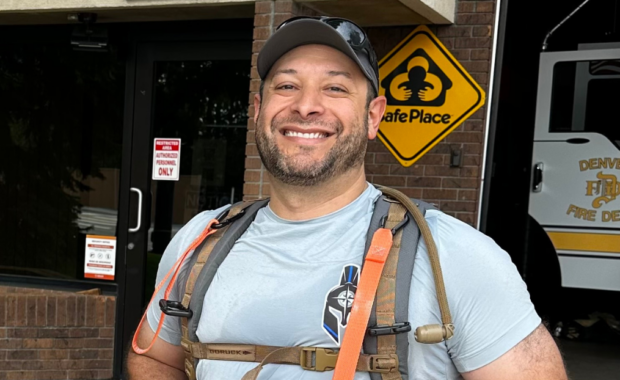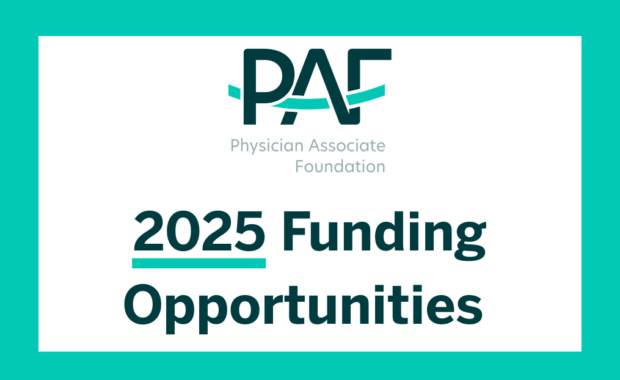What It’s Really Like to be a PA in Hospital Medicine
Attend AAPA and SHM’s Upcoming Boot Camp
August 1, 2018
By Kate Maloney
Hospitals are PAs’ largest employer group, and hospital medicine is an ever-changing practice setting. Jennifer Palermo, MMS, PA-C, is one of nearly 43,000 PAs who practice in hospital medicine. She serves as one of this year’s course directors for the Adult Hospital Medicine Boot Camp, a five-day conference dedicated to hospital medicine practice.
Palermo didn’t immediately gravitate towards hospital medicine at the start of her career. She completed her undergraduate education with a degree in elementary education and psychology. She couldn’t decide whether to be a teacher or a therapist, so she worked as a psychiatric case manager initially. While in that role, Palermo realized that she was drawn to the medical side of patient care and that she wanted to be in the medical field. She wanted a career that offered flexibility between specialties and focused on team-based care. She decided on PA school and enrolled at Midwestern University in Glendale, Arizona. Now, Palermo works as a hospital internal medicine (HIM) PA at Mayo Clinic Hospital in Phoenix, Arizona. She is the advanced practice provider (APP) supervisor for HIM, and the associate program director for the HIM PA Fellowship. She discussed with us what her life as a hospitalist PA is like.

How did you end up in hospital medicine?
JP: When I started PA school, I didn’t know which specialty I wanted to practice. I eagerly listened to all the lectures in PA school and spent my year plus on rotations. What I found was that I liked a little bit of everything and was drawn to the hospital setting. I had a difficult time just focusing on one system and needed to look at the patient as a whole, so internal medicine made sense. Also, I liked the acuity of hospitalized patients and the fast pace and variability of days in the hospital. Hospital internal medicine seemed like a good fit, but after I graduated, I felt like I needed more training. I completed a post-graduate PA fellowship at Mayo Clinic in Phoenix, Arizona. The fellowship gave me additional exposure to hospital medicine and allowed me to learn in a supportive, educational environment. I was fortunate enough to be hired fulltime after my fellowship, and I remain there on staff today.
What is scheduling like at your hospital?
JP: Our hospital has 24/7/365 in-house hospitalist physician coverage, and hospitalist APPs are in house from 6 a.m. – 2 a.m. every day. The APPs either work day or afternoon/evening shifts. On a day shift, my work day starts at 6 a.m. or 7 a.m. If I am assigned to an afternoon shift, my work day starts at noon or 2 p.m. We work 12-hour shifts and have six APPs on each day who work at staggered start times in order to provide adequate cover for patient care.
With the unpredictability of the hospital, getting out on time doesn’t always happen, but that’s expected. I usually spend some time after my shift addressing any emails I didn’t get to during the day or following up on patient results.
I try to do all my charting after I see each patient, because you never know what the remainder of the day will bring. I answer emails and do paperwork whenever I have a free moment. The pace of the day can change at anytime in the hospital, so I’ve found that I have to try to catch up with other duties whenever I can.
How many patients do you see a day?
JP: The number of patients I see each day is variable. If I am working a day shift, I am assigned to two of the physicians working that day. I call the two physicians at the start of my shift, and we determine who will see each patient. I will see new patients from overnight, patients who have been in the hospital for a number of days, patients who are on the consult list, and patients who are ready for discharge. Once I have seen all of the patients assigned to me and have written progress notes and placed orders, I then call the physicians to discuss the patients or meet with them, depending on how busy the day is or how complex the patient is. We work together as a team to get all the patients seen and then break for lunch. The afternoon is then typically spent doing new admissions and consults. Each new patient I see is staffed with the attending physician.
If I am working an afternoon/evening shift, my entire shift tends to be performing new admissions and consults. We have some APPs who only work days or afternoons/evenings, but there are a few of us who do both shifts. I enjoy working both shifts, because it’s a nice change of pace.
How do you generally evaluate and treat patients? What’s your approach?
JP: I try to take a standardized approach to evaluating patients. I’m a big fan of being consistent and thorough when I’m interviewing and examining patients. I find I make fewer mistakes that way. For example, when seeing patients in the emergency department (ED) who require admission to the hospital, I first review their medical record. If they have received treatment at Mayo Clinic previously, it is nice to be prepared with all their recent medical information. I usually jot some notes down, because that’s how I learn and remember. It has to be written down! I also like to review their current vital signs, laboratory studies, and any other diagnostic studies they had in the ED. I then go talk with and examine the patient in the ED. I like to try to get to know the patient and develop rapport. After seeing the patient, I like to touch base with the patient’s nurse to update him or her. Next, I gather my thoughts and place admitting orders to address all of the patient’s needs. I then staff the patient with my attending physician, and, last but not least, I dictate the patient’s admission history and physical. After that, I move on to the next thing on my to do list. There’s never a dull moment in the hospital!
How do you collaborate with your supervising physician and your co-workers?
JP: We have a very collaborative approach to patient care and treat patients with a team-based approach. Our physicians value our opinions and the perspective we bring. Even better than our working relationship with our physicians is the relationship we have with our APP co-workers. We are a close cohesive group of APPs. We share the same commitment to patient care and enjoy the work that we do. We discuss everything from interesting patient cases to stories about our kids to our favorite recipes. We really do have a “work family.” Having great colleagues is what makes me happy to come in to work day after day.
What are the unique characteristics of PAs in hospital medicine?
JP: PAs in HIM have to be flexible, organized, and able to multitask. Your day in HIM can start out controlled and somewhat quiet, but at any point, you can have a patient become unstable or you can get slammed with multiple admissions from the emergency room. You have to be able to go with the flow of the day. Another helpful characteristic of HIM PAs is being obsessive (in a healthy manner) about details to make sure all of the patient’s medical conditions are addressed and nothing is missed. We pride ourselves on providing comprehensive care to our patients while they are in the hospital.

How do you navigate work-life balance?
JP: Work-life balance is a difficult thing. This is something that I continually have to remain cognizant of, or it can easily tip the wrong way. While I thoroughly enjoy my job, I enjoy my children even more! I am someone who needs to work and keep busy, but to balance it out, I love spending time with my children. My daughter Avery is eight years old, and my son Evan is about to turn six. I volunteer at their school, watch their softball and baseball games, and host many play dates! Between my family and work, I add in some occasional downtime and time with friends, and it keeps me balanced and happy.
How does being a hospitalist PA work for your family?
JP: Being a hospitalist PA works well for my family life. We have come to adapt to shift work, and it works for us. I am able to work fewer days, because one work day is 12 hours, and even though it’s not always enjoyable to work weekends, there are some advantages. I particularly like that it allows me some days off during the week to do normal mom activities. Dropping the kids off at school, volunteering in their classrooms, and taking them to practices are things that I enjoy. And I won’t lie….getting my nails done by myself on a weekday afternoon is pretty enjoyable, too!
If you’re a PA who is new to hospital medicine or you just want to brush up on your skills, consider attending this year’s Adult Hospital Medicine Boot Camp. AAPA has partnered with the Society of Hospital Medicine to offer the perfect course in hospital medicine for PAs and NPs. Find out more about the course and register today!
Kate Maloney is AAPA’s senior manager of corporate communications. Contact her at [email protected].
Thank you for reading AAPA’s News Central
You have 2 articles left this month. Create a free account to read more stories, or become a member for more access to exclusive benefits! Already have an account? Log in.



